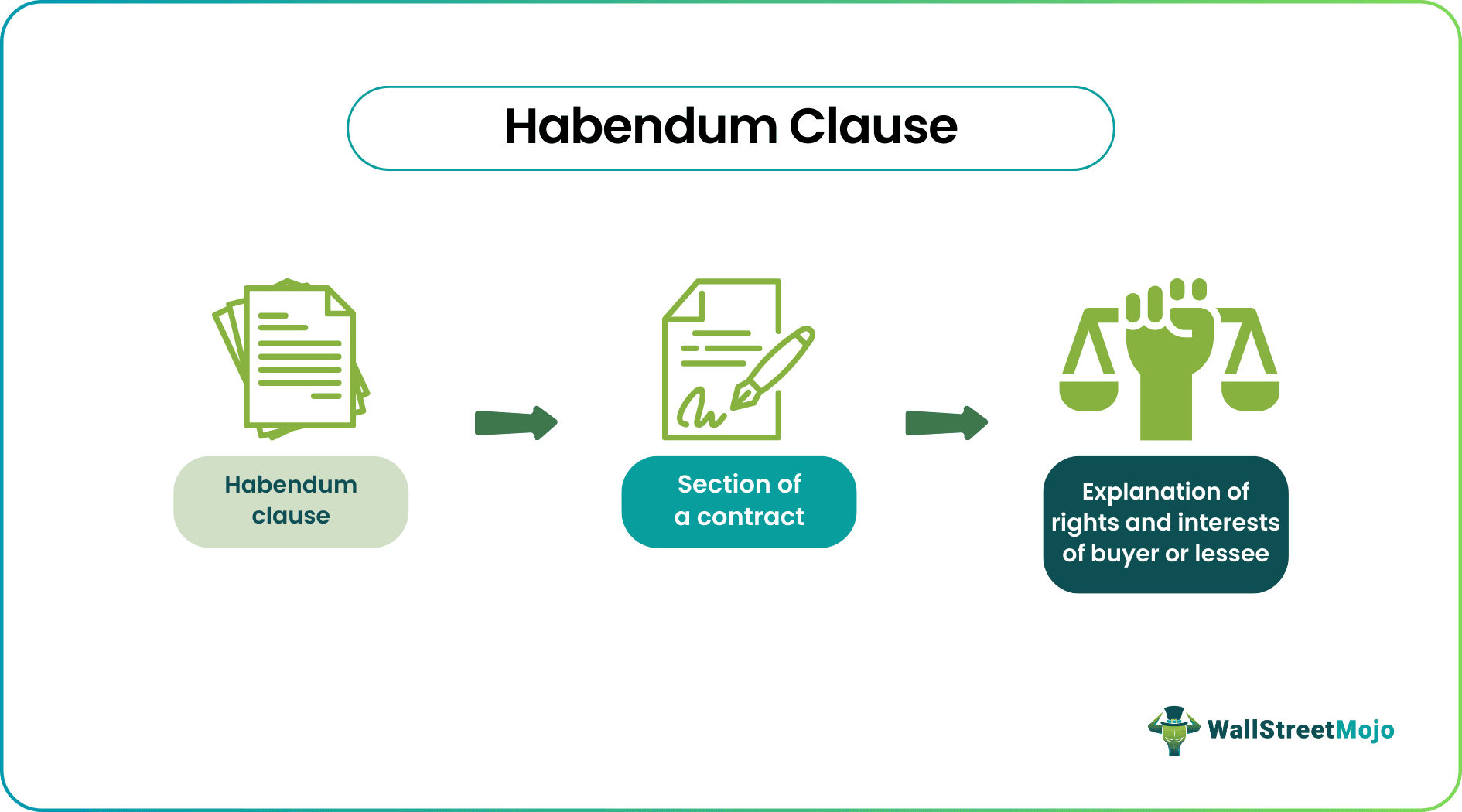Table Of Contents
What Is The Habendum Clause?
Habendum clause (to have and to hold) refers to a clause in a contract between the seller and the buyer of a real estate property that explains the lessee's rights, transfer, and ownership. It serves the main purpose of protecting the lessee's or buyer's rights and interests.

The habendum clause primarily signifies the nature of rights and dimensions of interest over the property being conveyed to the lessee or buyer. It can be used to make it mandatory for the lessee or holder to maintain the property and keep it safe from damage or loss. It can also contain provisions for various restrictions related to land treaties, timeshares and transfer or sale after the lessee's death.
Key Takeaways
- The habendum clause (to have and to hold) is a term in real estate agreements between buyers and sellers that addresses the lessee's rights, transfer, and possession of the property.
- Its primary purpose is to protect the rights and property of sellers, preventing unauthorized transfer of their rights and property.
- In oil and gas contracts, the habendum clause grants rights to possession and production, typically consisting of primary and secondary terms.
- The habendum clause details the lessee's rights, ownership, and interests in property or land deals.
- In contrast, the granting clause specifies property transfer between the listed grantor and grantee.
Habendum Clause Explained
The habendum clause is a statement section in a deed or contract describing the nature of rights and dimensions of interest over the property being conferred to the lessee or buyer. It always begins with the words to have and to hold, telling the buyer explicitly about the rights and ownership provided to them by the seller. The content related to the habendum clause keeps varying according to the type or location of the property.
The habendum clause in a deed represents the following:
- Lessee receives all the rights and ownership of the property without any alteration.
- The lessor guarantees not to transfer the right over the property to anyone else.
- It also warrants the buyer of the full title, claims and interest on the property bought for any subsequent sale.
- The original owners get the surety from the buyer of the property that they won't sell the property without the original owner's consent.
- It prevents the seller from selling a house forcefully or without consent or evicting owners without any legal notice in advance.
- It also establishes that any transfer, lease, or sale of a said property does not transfer the basic property ownership.
Many American states, like Pennsylvania, mandate that all deeds or contracts related to the sale, particularly for lease in oil and gas exploration, contain a habendum clause. These deeds or contracts must be formally acknowledged and registered with the recorder of deeds.
The habendum clause in the oil and gas sector gives rights of ownership and exploration, which contains two terms – primary and secondary. Under these clauses:
- The primary term is ten years, which expires in the absence of any exploration.
- The secondary term begins after the expiration of the first term with oil and gas production on the property.
Habendum Clause Restrictions
Although real estate deed has no restrictions, other property contracts contain restrictions. It contains three basic restrictions:
- Timeshare lease: It refers to the countdown of ownership, which means that if certain criteria are not met, then ownership of the property is transferred to another party.
- Treaty Lands: These treaties cap ownership by limiting the title transfer upon reaching a hundred years. In other words, such property or land becomes non-transferable after a hundred years. It presents a lucrative investment opportunity for buyers for the first fifty years of ownership and later turns into a discount due to the transfer cap limitation.
- Transfer post-death: The property title goes back to the land's original owner after the current possessor dies, indicating the transfer restriction of the ownership.
Examples
Let us use a few examples to understand the topic:
Example #1
Suppose a property owner (lessor) sells their house to a buyer(lessee). For this purpose, they ink and sign property rights agreements while carrying out the procedure of ownership transfer. Their contract contained the below Habendum-Clause:
The lessee will be entitled to have and hold the property for 20 years starting from the term commencement date. The duration will end on a day falling just prior to the completion of 20 years of the lease.
Example #2
Suppose ABC clothing store leases from XYZ Properties the premises located at M&M Street for a term of three years, commencing on January 1st, 2024, and ending on December 31st, 2026, subject to renewal upon mutual agreement. The habendum clause in the agreement explains that during the lease term, the ABC clothing store shall have the right to use the premises for retail purposes only and shall be responsible for maintaining the property in good condition.
Habendum Clause vs Granting Clause
The differences between the two are as follows:
| Habendum clause | Granting clause |
|---|---|
| It gets embedded into property-related contracts. | It is located in the conveyance contract. |
| These are the terms that define rights and restrictions concerning the transfer of property. | These special highlighted words represent the true transfer of interest from one stakeholder to another. |
| It simply details all the rights, ownership, and interests conferred on the lessee in property or land deals. | It highlights that the property is getting between the listed grantor and the grantee. |
| The clause has words related to the transfer of interest. | It shows the degree of interest conveyed by defining the estate granted. |
